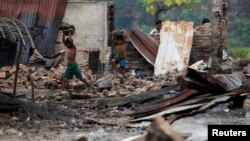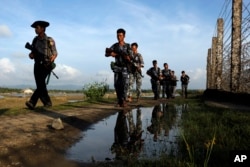The Myanmar government is to set up a “national level committee” to investigate conditions and allegations of abuses amid international pressure from rising violence and a humanitarian crisis in northern Rakhine state.
Myanmar’s state counselor and democracy icon Aung San Suu Kyi has faced growing criticism for failing to tackle the violence, as a military campaign targeting the Muslim Rohingya minority has triggered the displacement of tens of thousands.
Zaw Htay, a member of the State Counselors Office Information Committee, told Myanmar media the formation of the new investigative committee was underway.
The committee follows on the Rakhine State Advisory Commission, in place since August, under former United Nations Secretary General Kofi Annan, who recently expressed “deep concern” over violence.
Escalation
The violence has escalated in northern Rakhine since an attack on a border guard post on October 9 that left nine soldiers and police dead.
In subsequent operations, the military says 234 suspected attackers were arrested in Rakhine State from November 9 to 14, and 69 suspected attackers killed. The government says nearly 200 additional suspected attackers were detained from November 14 to 23.
Security analysts say there are mounting concerns about increasing militancy in the region, due in large part to past treatment of Muslims in Myanmar.
After violence in 2012, more than 120,000 Muslim Rohingya were forced to live in holding camps amid reports of squalid conditions, and tough restrictions on mobility.
Sidney Jones, director of the Jakarta based Institute for Policy Analysis of Conflict, says the threat of jihad would mark a transformation for the region.
“Up until now there hasn’t been a militant group of Muslims themselves committed to jihad. And now it looks like it’s beginning to be one. And that could make a major transformation in how the local extremist groups see a possible alliance,” Jones said.
Abuses
Human rights groups allege widespread abuses, including rape by Myanmar forces and the torching of hundreds of homes during the crackdown.
Chris Lewa, a rights activist for the advocacy group the Arakan Project, said the government’s operations, which she described as brutal, have escalated since mid-November. She added a lack of humanitarian access was affecting all communities, especially those in the Maungdaw region, near the Bangladesh border.
“It’s very brutal and the issue [in] that area is access to displaced people and even non-displaced. And it’s not only the poor, it’s everyone because they can’t access markets and they cannot harvest – this is going to lead to a humanitarian disaster,” she said.
Human Rights Watch has identified 430 destroyed buildings in three villages near Maungdaw using high-resolution satellite imagery.
The right’s group’s deputy Asia director, Phil Robertson, called the military’s response as a “clear overreaction.”
“It looks like the Burma army is off the hook and doing whatever they want in these areas pursuing scorched earth tactics – attacks on civilians – ostensibly in pursuit of these militants, but in fact a clear overreaction by the Burma military that is basically engaging in collective punishment against the Rohingya,” Robertson said.
Verification
The Irrawaddy newspaper reported [November 25] comments by the brother of the spokesman for the Islamic Council for Maungdaw, who said “hundreds of villagers” in the northern region had been killed in the past month, amid allegations of rape by government soldiers.
But Aung Zaw, editor in chief of The Irrawaddy, said it was “very important” for international access to the region to verify the abuse claims.
“A lot of human rights violation reports regarding that region need to be verified because both sides are claiming without any substance. The government denied this [the abuses].”
“The other side – how many people are being killed, how many houses are being burnt [down]. But this has to be treated carefully because there are a lot of campaigns on two sides without [taking in] the reality in the ground,” Aung Zaw told VOA.
He called for the international community to take into account frustration by local Buddhists over a lack of attention to the region’s economic development, seen as one of the poorest in Myanmar.
“When the West talks about the Rohingya issue – they only talk about Rohingya – and there’s a deep polarization, we are headed into a dangerous era, because the way they see things is very much black and white. They don’t talk about it in nuances on the ground,” he said.
Amid the crackdown, thousands of Rohingya have fled into neighboring Bangladesh, with many being forcibly pushed back, which Amnesty International called a “flagrant violation of international law”.
Last Friday, some 5,000 people protested in the Bangladesh capital, Dhaka, against the violence on the Rohingya. The Malaysia government also issued a statement, calling on the government of Myanmar “to address the alleged ethnic cleansing in the northern Rakhine State.”
Members of Annan’s commission have been in talks with both Buddhist civil society and Muslim religious leaders.
The commission also called for the protection of women and children during army operations and for stateless Rohingya to be granted official government citizenship.
Myanmar’s central government and local Buddhist communities oppose the use of the term “Rohingya,” preferring to use the term Bengali for some 1.3 million Muslims living for the most part in northern Rakhine state.
The community has faced widespread discrimination since a 1982 law stripped many of their citizenship. The United Nations High Commission for Refugees (UNHCR) estimates there are more than 800,000 individuals in Rakhine state lacking citizenship.






